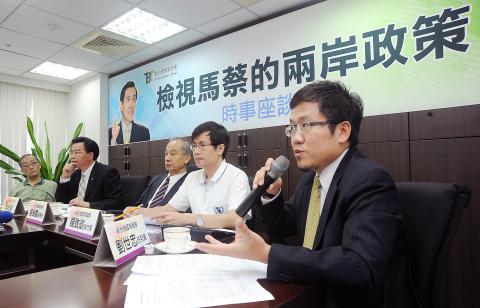|
Strategic ambiguity
beneficial: forum
BALANCING ACT: Lo Chih-cheng said no one would
win if cross-strait ties became the focus of January’s elections and Ma, Tsai
and China had to declare their positions
By Chris Wang / Staff reporter

From right to left, Taiwan Brain
trust research fellow Liu Shih-chung, chief executive Lo Chih-cheng, chairman Wu
Rong-i, former Mainland Affairs Council chairman Joseph Wu and National Taiwan
University economics professor Lin Hsiang-kai talk about the cross-strait
policies of President Ma Ying-jeou and Democratic Progressive Party Chairperson
Tsai Ing-wen at a press conference in Taipei yesterday.
Photo: Liu Hsin-de, Taipei Times
The Democratic Progressive Party’s (DPP)
strategically ambiguous China policy could serve the interests of all political
parties on both sides of the Taiwan Strait and a strategic reassurance to the US
will be vital in its quest to return to power, academics said yesterday.
President Ma Ying-jeou (馬英九) and his Chinese Nationalist Party (KMT) have
repeatedly branded DPP Chairperson Tsai Ing-wen’s (蔡英文) China policy as
“ambiguous” and “hollow,” but the KMT’s plan to make cross-strait relations the
central theme of the presidential campaign could come back to haunt it, Lo
Chih-cheng (羅致政), a political scientist at Soochow University, said in a forum
organized by Taiwan Brain Trust think tank on Ma’s and Tsai’s China policies.
It is obvious that Tsai, the DPP’s presidential candidate, would like to focus
her campaign on social issues and has deliberately kept her cross-strait policy
ambiguous, Lo said, adding that the phrase “1992 consensus” did not appear in
the DPP’s recently announced 10-year policy guidelines.
The DPP has intentionally ignored the cross-strait issue to the point that it
did not discuss the consensus or the political status of Taiwan and China at all
in its guidelines, he said.
“And it had implemented this strategy for a good reason: to preserve the
flexibility and room to maneuver in the future development of bilateral ties —
both for the DPP and the Chinese Communist Party,” he said.
However, Ma and the KMT would like to make cross-strait relations the main theme
of the presidential campaign because they think it will give them an advantage,
he said.
“Does Beijing really want to make everything in cross-strait engagement crystal
clear?” Lo said. “If that’s true, we would like to demand Beijing explain what
exactly the [so-called] ‘1992 consensus’ is.”
If cross-strait ties become the central theme of the election, Tsai, Ma and
China will all have to declare their positions, he said.
“I don’t think it would benefit anyone, because that would make the 2012
presidential election a referendum on unification and independence,” Lo said.
Tsai faces another challenge — how the US will view her China policy, said Liu
Shih-chung (劉世忠), a researcher at Taiwan Brain Trust.
The US may not understand the recent rhetorical battle about the “1992
consensus,” but it cares about the peace and stability of the Taiwan Strait, Liu
said.
The US could seek reassurance from Tsai during her visit to Washington this
month, as it did with former president Chen Shui-bian (陳水扁) and Ma.
For example, he said, Chen came up with his “five noes,” which enraged his
party’s fundamentalists, to reassure the US, while Ma announced his “three noes”
policy of “no unification, no independence and no use of force.”
Liu urged Tsai to tackle the challenge head-on by offering a “five yeses”
policy, pledging to maintain consistency and transparency in her policy-making;
rebuild mutual trust between Taiwan and the US; strengthen national defense;
ensure the “deepening” of democracy in Taiwan and play an active role in the US’
strategic balance efforts in the Asia-Pacific region.
Liu agreed that China has started to re-evaluate the outcome of the presidential
election and has initiated academic exchanges to gauge the DPP’s position and
policy in case Tsai wins the election.
China has always tried to influence elections in Taiwan, said Tung Chen-yuan
(童振源), a National Chengchi University professor and a former vice chairman of
the Mainland Affairs Council.
“However, every time it has had to accept the choice people of Taiwan made and
move on — by resuming bilateral dialogue,” he said.
|
![]()
![]()
![]()